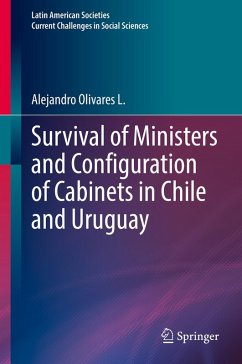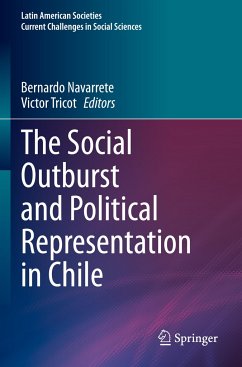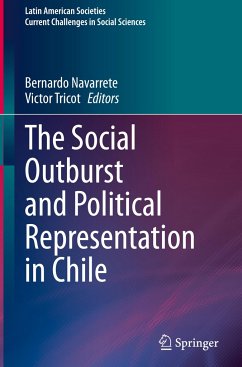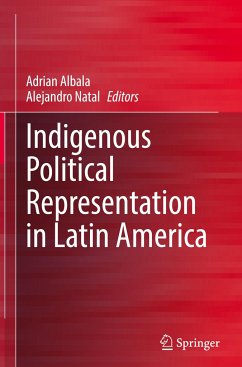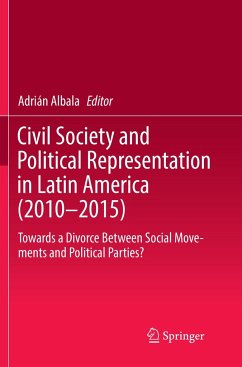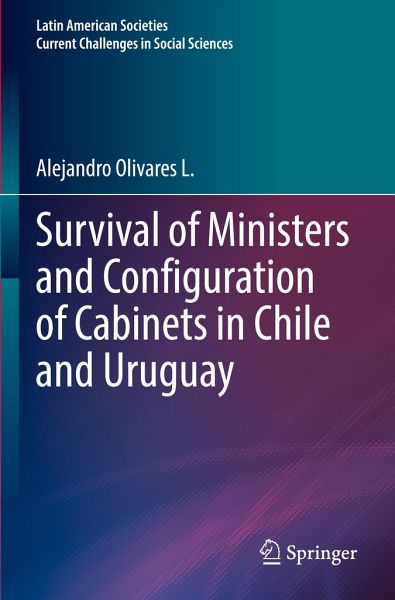
Survival of Ministers and Configuration of Cabinets in Chile and Uruguay
Versandkostenfrei!
Versandfertig in 6-10 Tagen
83,99 €
inkl. MwSt.
Weitere Ausgaben:

PAYBACK Punkte
42 °P sammeln!
This book develops an analysis of ministerial recruitment in the process of government formation, the process of dismissal, and survival of cabinet ministers in Chile and Uruguay. The two cases are countries that, generally, score the highest democracy indexes in Latin America, but also, they are considered as the most stable presidential systems in the Southern Cone of the region, allowing readers to compare within and between cases.The cases analyzed in this book are small countries with a similar history of democratic breakdowns which, in temporal terms, enable comparison. Additionally, giv...
This book develops an analysis of ministerial recruitment in the process of government formation, the process of dismissal, and survival of cabinet ministers in Chile and Uruguay. The two cases are countries that, generally, score the highest democracy indexes in Latin America, but also, they are considered as the most stable presidential systems in the Southern Cone of the region, allowing readers to compare within and between cases.
The cases analyzed in this book are small countries with a similar history of democratic breakdowns which, in temporal terms, enable comparison. Additionally, given the reasons that triggered those processes, both cases are normally studied together. For pre-coup democracy, the cases include the governments of Chile between 1933 and 1973 and Uruguay between 1943 and 1973. This research does not analyze the military coup regime in either country. Thus, the period is resumed in the democratic transitions for both cases, i.e., 1985 for Uruguay and1990 for Chile.
Although literature on ministerial cabinets survival usually focus on parliamentary regimes from the Global North, this rather new phenomenon in presidential democracies has quickly gained academic notoriety. Research on cabinets and ministers in Latin American presidential systems tends to focus on the periods beginning with the return to democracy after the 1980s. This situation means that there is scant knowledge of the period prior to the coups. By presenting an in-depth study of two presidential systems from the Global South, Survival of Ministers and Configuration of Cabinets in Chile and Uruguay, will be a useful resource for political and social scientists willing to study cabinet formation and ministerial turnover in Latin America, whether is on case-study research or in a comparative perspective.
The cases analyzed in this book are small countries with a similar history of democratic breakdowns which, in temporal terms, enable comparison. Additionally, given the reasons that triggered those processes, both cases are normally studied together. For pre-coup democracy, the cases include the governments of Chile between 1933 and 1973 and Uruguay between 1943 and 1973. This research does not analyze the military coup regime in either country. Thus, the period is resumed in the democratic transitions for both cases, i.e., 1985 for Uruguay and1990 for Chile.
Although literature on ministerial cabinets survival usually focus on parliamentary regimes from the Global North, this rather new phenomenon in presidential democracies has quickly gained academic notoriety. Research on cabinets and ministers in Latin American presidential systems tends to focus on the periods beginning with the return to democracy after the 1980s. This situation means that there is scant knowledge of the period prior to the coups. By presenting an in-depth study of two presidential systems from the Global South, Survival of Ministers and Configuration of Cabinets in Chile and Uruguay, will be a useful resource for political and social scientists willing to study cabinet formation and ministerial turnover in Latin America, whether is on case-study research or in a comparative perspective.





